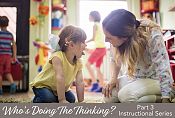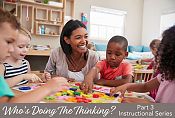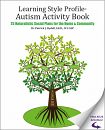Learning Style Profile© Part IV: LSP Questionnaire - A Protocol For Identifying Social-Communication-Behavioral Breakdowns Between Children With ASD And Partners In The Classroom And Therapy #e301
Presenter: Patrick Rydell, Ed.D., CCC-SLP
Learning Style Profile© Questionnaire (LSPQ)
This course will introduce and explain how to use the Learning Style Profile Questionnaire, which is based on the Learning Style Profile for Children with Autism Spectrum Disorder (Rydell, 2012).
This course is the fourth in the LSP Training Series by Dr. Pat Rydell and examines social, communication and behavioral breakdowns in children who have autism. This course provides an in-depth discussion and game plan for consulting with teachers and parents and a tool for treatment planning. Also included in this course are 23 therapy demonstration videos.
In spite of Speech-Language Pathologists’ best efforts to implement evidence-based, best practice with children with ASD (and related disorders), social-communication-behavioral breakdowns may still occur in our classrooms and intervention environments. At times, our interpersonal interactions may unintentionally trigger, or at least contribute to these breakdowns, especially for those children with ASD who are already contending with their own learning style challenges. These interpersonal triggers may be small and nuanced....but, sometimes little things make a big difference. “Why did our session break down?” “What do we do when....?” ASD education and intervention can be challenging at many levels!
This advanced course identifies 50 common scenarios in which social-communication-behavioral breakdowns are more likely to occur between the child with ASD, the Speech-Language Pathologist and/or other participants (e.g., teachers and peers) in individual and group settings. Videos, talking points and discussion are used to illustrate and explain the sources of interactional breakdowns specific to each of the 10 LSP components.
Course is offered for 1.1 ASHA CEUs – 11 contact hours.
Course Overview – Run Time: 11:27:07
Total time including 23 strategy reference videos.
- Object vs. People Orientation: Does your child pay more attention to objects than people?
- Learning Through Social Modeling, Demonstration, and Rehearsal: Does your child have difficulty learning the social-communication and interactional skills modeled by others?
- Attains Social Cues from Multiple Partners: Does your child receive social-learning cues from only one person at a time?
- Level of Flexibility with Objects, People and Activities: Does your child interact with objects and/or people in a rigid/repetitive/inflexible manner?
- Shared Control: Does your child form his/her own agenda and insist that others follow it?
- Interaction Style: Does your child respond to other people in restricted ways during social interactions and only for certain purposes?
- Symbolic/Verbal Communication: Does your child primarily use scripted or memorized verbal phrases for communication?
- Executive Function: Does your child have difficulty implementing a plan to complete a task or activity?
- Distance Learning: Does your child respond to others only when they are at a close distance?
- Transitions: Does your child resist transitions in activities, events, locations, and/or routines?
Stop and re-start the course at any point. Learners retain access to course content after completion for ongoing reference and review.
This presentation will focus exclusively on the Learning Style Profile© (LSP). Other treatment approaches will receive limited or no coverage as part of this training. Presenter financial and non-financial disclosures may be found in the Presenter & Disclosures area.
Video PowerPoint presentation with author narration & downloadable handout. Stop and re-start the course at any point. Learners retain access to course content after completion for ongoing reference and review.
Reviews
"LSP Strategy was beneficial to discuss. I liked the guidelines for addressing ASD therapy." R.T. (Dec. 2024)
"Beneficial strategies for sensory seeking and avoidant children. This course discussed ways the communication partners, therapist, and environment play a role in successful interactions. I benefited from his explanation of possible barriers and he gave great recommended strategies. I appreciate the importance of recognizing these learning styles and I thought his suggestions for adaptations was well thought out with great examples." N.B. (Dec. 2024)
"I have many children with ASD on my caseload this year. This course detailed new ways to identify social-communication skills and behavioral breakdowns between children with ASD and teachers/peers in the classroom and therapy room. I learned from the case studies that were presented in detail." K.B. (Nov. 2024)
"The use of JARS was beneficial. Thorough explanations and practical ways to implement strategies." M.L. (Nov. 2024)
"I liked the video examples followed by adaptations/adjustments." H.C. (Nov. 2024)
"Entire course is valuable. I loved how videos are used and different scenarios are discussed to reinforce concepts presented." G.S. (Aug. 2024)
"I loved all of the video examples." M.W. (Jul. 2024)
"Including peers during therapy for students with ASD was a beneficial topic. I liked the visual examples." C.C. (May. 2024)
"Loved the soccer practice - soccer game approach and Texas two-step. I enjoyed the video that showed the left-to-right agenda and coaching model." P.B. (May. 2024)
"As a parent with social communication disorder, the very specific examples with video to support I found extremely helpful. Certain techniques were broken down into steps that were not complex to follow. The presenter was clear and was able to have his message understood through the way the lecture was structured." E.L. (Apr. 2024)
"Discussing learning style for ASD was beneficial." S.W. (Feb. 2024)
"The strategies to work with traditional moments were helpful. I liked the discussion of the significance of echolalia in children with ASD." A.D. (Dec. 2023)
"I liked the video examples and structured walkthroughs of LSP questions and suggestions." L.M. (Dec. 2023)
"Learning which strategies and models best support a child with ASD learning in the classroom. The handouts and the videos worked well together in presenting the information." M.L. (Dec. 2023)
"The inclusion of videos made the course more relatable." K.O. (Dec. 2023)
"The videos specific to each profile were helpful." W.S. (Nov. 2023)
"I liked the analysis of what causes communication breakdowns and the resolutions to keep that from happening." T.P. (Nov. 2023)
"Clear presentation style. The concept of who is doing the thinking and to forget about being correct, which can happen later, was beneficial." S.D. (Oct. 2023)
"I found this whole course to be beneficial for my practice. It was very well organized and presented clearly. The instructor is extremely knowledgeable on the subject area and provides practical information that can be applied to daily practice. The use of video examples was wonderful!" A.G. (Oct. 2023)
"I enjoyed when the presenter showed the video of the child with the sensory object of his preference; he fixated on the object only. The presenter gave excellent feedback on how we can help children to gradually fade out desired sensory objects and replace them with new ones without the child throwing severe tantrums. This information is very useful for my daily practice because I do have children with ASD who focus more on objects than people." A.M. (Aug. 2023)
"I liked the videos and the handouts, and also how the instructor went through each section with us helping to identify target areas to address as it pertained to each child's area of difficulty." A.M. (Aug. 2023)
"The videos were very helpful." J.C. (Mar. 2023)
"Videos 3 through 10 were the most beneficial for daily practice. I appreciate Dr. Rydell's comprehensive handouts for his courses." L.A. (Feb. 2023)
"Discussion of breakdowns during transitions was beneficial. Course was easy to understand. I liked the classroom examples." J.D. (Feb. 2023)
Course Objectives
- Describe the 10 Learning Style Profile Questionnaire (LSPQ) components.
- Apply the LSPQ protocol to identify interactive scenarios in which social-communication-behavioral breakdowns are more likely to occur between the child with ASD and partners (e.g., Speech-Language Pathologists).
- Use the LSPQ protocol to modify, adapt and adjust partner interaction strategies to decrease the potential for social-communication-behavioral breakdowns to occur with the child with ASD in future social exchanges.
Presenter & Disclosures

Patrick J. Rydell, Ed.D., CCC-SLP, is the Founder and Director of the Rocky Mountain Autism Center, Inc. and Autism On Call, LLC, in Lone Tree, Colorado. With more than 38 years of practice (“on the floor”) in the field of Autism Spectrum Disorder (ASD), he has provided international and national trainings, workshops, consultations and program development to governmental agencies, medical facilities, universities, school districts, professionals and families. His doctorate was earned through a National Institute of Health Leadership in Autism grant (1989) and he has a double master’s degree in speech pathology and special education with a program emphasis in early childhood and autism spectrum disorder. Dr. Rydell is a U.S. Fulbright Senior Specialist Grant recipient (2005). Dr. Rydell is the co-author of the SCERTS Model (Prizant, Wetherby, Rubin, Laurent & Rydell, 2006) and author of the Learning Style Profile for Children with Autism Spectrum Disorder (Rydell, 2012) and Autism On Call Educational Series (Vimeo, 2017). Dr. Rydell has also co-authored 5 book chapters and numerous peer-reviewed research articles on topics related to autism spectrum disorders. He is currently developing ASD programs across Asia, Central Asia, and South America based on the LSP approach.
Speaker Disclosures:
Financial — Patrick Rydell is a presenter of online CE courses sponsored by Northern Speech Services; receives royalty payments.
Financial — Patrick Rydell is the author of Learning Style Profile Autism Activity Book; receives royalty payments.
Financial — Patrick Rydell is the author of Learning Style Profile for Children with Autism Spectrum Disorder, published by Rocky Mountain Autism Center (January 21, 2013); receives royalty payments.
Nonfinancial — Patrick Rydell has no relevant nonfinancial relationships to disclosure.
Intended Audience / Accreditation

This program is offered for 1.1 ASHA CEUs (Advanced Level; Professional Area).

Intended Audience
- Speech-Language Pathologists
ASHA CEUs: NSS online courses are registered with ASHA and are offered for ASHA CEUs. The number of ASHA CEUs is noted above. Note that 0.1 ASHA CEU = 1 contact hour = equals 1 CEE.
ASHA CE Registry: During the enrollment process, if you select to receive ASHA credit for this course and if you provide your ASHA number, NSS will automatically submit your CEU information to the ASHA CE Registry after successful course completion (80% on post test). This submission happens once per month, during the first week of the month. For example, if you complete your course on November 7th, NSS will submit all November online course CEUs to ASHA during the first week of December. When ASHA inputs the information into their database, they will mark the course as completed on the last day of the month in which it was completed, so November 30th using this example. The certificate of completion available for you to print immediately, however, will reflect the actual completion date, November 7th in this example. Due to ASHA processing procedures please allow 2-3 weeks, from the submission date, for the course to appear on your ASHA transcript.
ASHA CEUs: Attendees must meet at least one of the following conditions in order to be eligible to earn ASHA CEUs:
- Current ASHA Member.
- ASHA Certificate of Clinical Competence (CCC) Holder.
- Licensed by a state or provincial regulatory agency to practice speech-language pathology (SLP) or audiology.
- Credentialed by a state regulatory agency to practice SLP or audiology.
- Credentialed by a national regulatory agency to practice SLP or audiology.
- Engaged in a Clinical Fellowship under the supervision of an individual with their ASHA CCC.
- Currently enrolled in a master's or doctoral program in SLP or audiology.
If an attendee is not an ASHA member or CCC holder but meets any of the above criteria, they may inform the ASHA CE Registry of their eligibility by visiting this site.
Licensing Boards: Most state licensing boards DO accept CEUs earned online (usually classified as home-study credits). Some state boards do, however, place a limit to the number of credits that can be earned via home study/online courses. For the most current information, we suggest that you contact your licensing board or agency to verify acceptance policies and/or any credit limits related to home-study courses prior to registering for this course.
Additional accrediting agencies by which Northern Speech is an approved CE provider:
- California: NSS is approved as a provider of continuing education by the California Speech-Language Pathology & Audiology Board. Provider #PDP4. Online CEU limits may apply; please contact SLPAHADB for current online CEU acceptance policies.
- Iowa: NSS is approved as a provider of continuing education by the Iowa Board of Speech Pathology and Audiology Examiners. Provider #169.
- Kansas: NSS is approved as a provider of continuing education by the Kansas Department of Health and Environment. Provider #LTS-S0005.
- Florida: NSS is approved as a provider of continuing education by the Florida Speech-Language Pathology and Audiology Board. Provider #SPA-026.
- New Jersey: NSS is approved as a provider of continuing education by the New Jersey Department of Education. Provider #1654.
Frequently Asked Questions
Customer Support: Please phone 888.337.3866 or email info@northernspeech.com.
Course Completion Timeframe:
You have unlimited time to complete our online courses. You may log off and log on as often as you’d like to in order to complete all sections of a course.
However, completion dates are based on Eastern Standard Time. Therefore, if you need your CEUs by a certain date, be sure to complete the course test before 11:59pm EST on that date. For example, if you need CEUs before January 1st, you will need to complete the course test before 11:59pm EST on December 31st.
Content Access:
Access to course materials and content does not expire, even after completing the post test. You may continue to review course material by logging into your NSS account, clicking the My Online Courses tab, and then viewing your desired course.
Certificate of Completion:
On successful completion of the post test (80%), a certificate will be immediately available for download and/or printing. This certificate will include your name, date of completion (based on Eastern Time Zone, USA/Canada), and number of contact hours (CEUs / CEEs). Please note that CEUs are awarded on the date of successful test completion, not the date of course enrollment. Please ensure that you successfully complete the post test prior to any licensure renewal dates.
ASHA CE Registry Submission:
During the enrollment process, if you select to receive ASHA credit for this course and if you provide your ASHA number, NSS will automatically submit your CEU information to the ASHA CE Registry after successful course completion (80% on post test). This submission happens once per month, during the first week of the month. For example, if you complete your course on November 7th, NSS will submit all November online course CEUs to ASHA during the first week of December. When ASHA inputs the information into their database, they will mark the course as completed on the last day of the month in which it was completed, so November 30th using this example. The certificate of completion available for you to print immediately, however, will reflect the actual completion date, November 7th in this example. Due to ASHA processing procedures please allow 2-3 weeks, from the submission date, for the course to appear on your ASHA transcript.
Purchase Orders:
Purchase orders are currently not accepted for online orders, if you wish to submit a purchase order please do so at info@northernspeech.com or fax to 888-696-9655.
What is an Online Course?
Our Online Courses consist of video, audio, and/or text content and are offered for ASHA CEUs. Unlike a webinar, which requires participants to be logged on and at a computer at specific times, our Online Courses are available to you at any time, from any device, via your NorthernSpeech.com online account. You may work at your own pace and start and stop your course as you wish. Your course will conclude with a short post test. On successful completion of the post test (>80%), a printable certificate of completion is presented to you.
Receiving CEUs:
Northern Speech is an ASHA CE Provider and our online courses are registered with ASHA and offered for ASHA CEUs. Please note that successful completion of the online post test is required prior to the awarding of CEUs. Please contact your state licensing board for acceptance policies related to CEUs earned online. Please note that courses offered for university students are not applicable for CEUs.
Registering for an online course:
You may browse all online courses by clicking the Continuing Education tab above, then Online Courses. Once you find a course, click Enroll Now, and you will be asked to either log into your existing Northern Speech account or create a new online account. Once you’ve entered your account information and provided your credit card payment, your course will be immediately available to you.
Accessing your purchased course or returning to a purchased course:
You will be able to access your online course by logging into your Northern Speech account and then clicking the My Online Courses tab on your profile screen. Click the course you would like to start or to resume. From there, proceed through the course sections until you are ready to complete the post test. You do not have to complete your course all at once. You may log on and off as you wish.
Testing requirements:
Each online course concludes with a post test consisting of multiple choice or true & false questions. Scores of 80% or greater are required for successful course completion and awarding of CEUs. You may revisit course materials and retest as needed to achieve a passing score.
Number of CEUs offered:
We offer courses from 1 to 21 contact hours. Each course will note the number of CEUs offered. Please note that 0.1 CEU = 1 contact hour = 1 CEE.
State licensing boards and online CEUs:
NSS is an ASHA CE Provider and most state licensing boards DO accept ASHA CEUs earned online (usually classified as home-study credits). Some boards do, however, place a limit to the number of CEUs that can be earned via home study/online courses. For the most current information, we suggest that you contact your licensing board or agency to verify acceptance policies and/or any CEU limits related to home-study courses prior to enrolling in an online course.
Course formats:
Our course formats include: text, audio, video, and PowerPoint with author narration. Each course will note the format on the course description page. Most courses include closed captioning.
Course handouts:
Most of our online courses provide a link to download the accompanying handout as a PDF file.
Group discounts:
Groups of 3 or more are eligible for a 20% discount on each registration on most of our online courses. To receive this discount, registrations need to be processed together via the "Group Rates" tab on the Online Course of your choice.
Computer requirements:
For our online courses to function best, we recommend that you update your computer to include the newest version of your Internet browser (Safari, Chrome, Firefox, Edge, Internet Explorer, etc.) and newest version of your computer's operating system. Also a high-speed Internet connection is recommended (cable or DSL). Speakers or headphones will be required for many of our courses as many contain audio components.
Course Cancellation Policy:
A purchased online course can be exchanged, refunded, or transferred to another individual if contact is made with NSS (via phone or email) within 30 days of purchase and the course materials have not been viewed or downloaded.
Special Needs:
Please click here for any special needs requests, and we will do our best to accommodate them.
| Contact Us |









